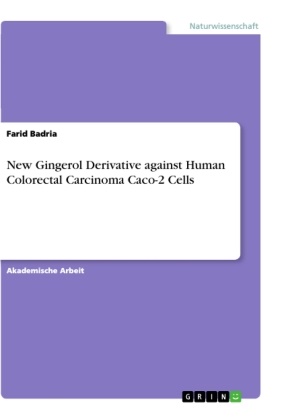Condividi
Fr. 25.50
Farid Badria
New Gingerol Derivative against Human Colorectal Carcinoma Caco-2 Cells
Tedesco · Tascabile
Spedizione di solito entro 1 a 2 settimane (il titolo viene stampato sull'ordine)
Descrizione
Akademische Arbeit aus dem Jahr 2013 im Fachbereich Chemie - Biochemie, , Sprache: Deutsch, Abstract: In this article we report the isolation, characterization and evaluation of in vitro anti-colon cancer activity of a new gingerol derivative, namely (S,E)-5-hydroxy-1-(4-hydroxy-3- methoxyphenyl)tetradec-8-en-3-one, (N6), and a known sesquiterpene (1,2- Dihydroxybisabola-3,10-diene, N7), isolated from Zingiber officinale rhizomes for the first time, together with other five known compounds. 6-gingerol (N1), 8-gingerol (N2), 10- gingerol (N3), 4-gingerol (N4) and 4`-O-methyl-6-gingerol (N5).
The isolated compounds were identified using different spectroscopic techniques (1D and 2D-NMR, MS and IR). A modified chromatographic method was established and optimized to isolate the major gingerols (N1, N2, and N3) in grams. Thereafter the cytotoxic activity of the isolated compounds was evaluated against colorectal carcinoma cell line, Caco-2. It was observed that anti-colon cancer activity of N2 was superior to that of 5-FU, the classic reference cytotoxic agent. Additionally, the length of the aliphatic chain in 8-gingerol (N2) is optimum for the anticancer activity and any decrease, as in N1 and N4, or increase, as in N3, in the side chain length leads to gradient decrease in the cytotoxic activity.
Following this further, methylation of phenolic OH group (N5), leads to a dramatic decrease in the anticancer activity. Furthermore, loss of aromaticity (N7), results in complete loss of the cytotoxic activity. On the other hand, introducing a pi-bond in the aliphatic side chain enhances the anti-cancer activity as depicted in N6. Taken together, the aromaticity, the side chain length as well as the presence of free phenolic group contribute significantly to the anti-colon cancer activity of gingerol and its derivatives. These results open up a new window in the rational design of gingerol-based semisynthetic drugs with improved anticolon cancer activity.
Info autore
Professor Farid Badria, (currently an Emeritus Professor in Pharmacognosy De-partment), Ph.D. in Microbial Transformation from the University of Mississippi, USA, and 2 Masters of Science in Pharmacognosy and Cell Biology from Egypt and USA
TWAS-ARO- TWAS-ARO, in "Public Understanding and Popularization of Sci-ence (2013), World Intellectual Property Organization (WIPO) Gold Medal as The Best Inventor in Egypt (2011), Recognition Outstanding Award in Medicine (Egypt, 2001), Outstanding Arab Scholar, Kuwait (2000); Khawrazmi Award, Iran (2000), are just to mention some of the awards he received.
Prof. Badria has submitted 43 patents, of which 16 had been granted certificates with intellectual protection for 20 years. With over 200 publica-tions, 8 books, and many review articles, He continues to lead research projects on: developing new therapy for liver disorders, arthritis, skin disor-ders, and biomarkers for cancer.
Research Interests:
Applications of Artificial Intelligence in Medical and Pharmaceutical Sciences
- Diagnosis of Cancers (Ovarian and Liver)
- Diagnosis of Pathological Disorders of Retina.
- Decision Making of Viral infection of liver.
- Prediction of Health Hazards of Obesity.
- Predication of Developing Liver Cancer
- Optimization of Extraction Methods of Medicinal plants.
NEW THERAPEUTICS AGENTS AS ENZYMES MODULATORS
- Inhibitors for Aldose reductase for treatment of Cataract
- Inhibitors for Amylase and Glucosidase for treatment of Obesity and Diabetes.
- Inhibitors for Proline hydroxylase for treatment of Liver Fibrosis.
- Inhibitors for Tyrosinase for treatment of Hyperpigmentation.
- Inhibitors for Hyaluronidase for treatment of skin aging
- Inhibitors for Topoisomerase for treatment of cancer
- Inhibitors for Leukotriene Hydrolase for treatment of Inflammatory Disorders (Hepatitis, IBS, Bronchial Asthma)
Developing New Therapy for Liver Disorders
- Hepatoselective Fibrosuppressive Agents from Natural Origin.
- Early Diagnosis and Intervention of Progress of Liver Cancer
- Mechanism of Natural Products on Hepatic Stellate Cells, fatty liver, and HCC.
- Natural Endogenous Interferon Stimulant from Natural Products
- Schistomicidal Agents
Developing New Therapy for Skin Disorders:
- Phytotherapy for Alopecia Aerata
- New Phytotherapy for Hirsutism and Hyperpigmentation disorders
- New Therapy for Amyloidosis
Biomarkers: A New Marker for Hepatocellular Carcinoma, nephropathy, and liver fibrosis
-
Dettagli sul prodotto
| Autori | Farid Badria |
| Editore | Grin Verlag |
| Lingue | Tedesco |
| Formato | Tascabile |
| Pubblicazione | 01.01.2019 |
| EAN | 9783346078810 |
| ISBN | 978-3-346-07881-0 |
| Pagine | 36 |
| Dimensioni | 148 mm x 210 mm x 2 mm |
| Peso | 68 g |
| Serie |
Akademische Schriftenreihe Akademische Schriftenreihe Bd. V509328 |
| Categoria |
Scienze naturali, medicina, informatica, tecnica
> Chimica
> Chimica organica
|
Recensioni dei clienti
Per questo articolo non c'è ancora nessuna recensione. Scrivi la prima recensione e aiuta gli altri utenti a scegliere.
Scrivi una recensione
Top o flop? Scrivi la tua recensione.

